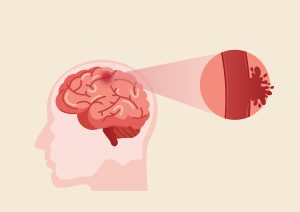Vegetarians usually are healthier than meat eaters, but a new study showed an increased stroke risk in vegetarians. The study came from the UK where researchers followed 48,000 people for 18 years. They classified people into meat eaters, pescetarians (fish eaters) and vegetarians, including vegans. Vegetarians and vegans had a 20% higher risk of developing a hemorrhagic stroke than meat eaters. At the same time vegetarians had a 22% lower risk of developing a heart attack, compared to meat eaters. Pescetarians had a 13% lower risk to develop heart attacks than meat eaters. The puzzle in this research finding is why vegetarians and vegans had a high risk of strokes. I will discuss this further below. The full study was published on Sept. 4, 2019 in the British Medical Journal.
Details of the study
The average age of the 48,000 participants was 45 years. There were 24,428 meat eaters, 7,506 fish and seafood eaters (pescetarians) and 16,254 vegetarians and vegans. During the 18-year follow-up 2,820 cases of heart attacks and 1,072 cases of strokes (519 ischemic and 300 hemorrhagic strokes) occurred. The study was carefully controlled for concomitant factors like smoking and exercise. Pescetarians did not have a higher stroke rate as vegetarians and vegans did. The researchers argued that pescetarians’ cholesterol levels were not as low in vegetarians. And they did not have deficiencies of vitamin B12 as vegetarians did. The food of vegetarians and vegans does not provide enough vitamin B12. They have to take supplements to prevent low vitamin B12 levels in order to prevent pernicious anemia.
Pescetarians, vegans and vegetarians have less heart attacks
The finding of pescetarians having 13% less heart attacks than meat eaters needs further explanation. Compared to meat eaters pescetarians, vegans and vegetarians have a lower average body mass index and have lower blood pressure readings. In addition, they have lower cholesterol readings and lower diabetes rates. All this leads to less coronary artery occlusions resulting in less heart attacks.
Editorial from Prof. Mark Lawrence and Prof. Sarah McNaughton
In an editorial these professors from Deakin University in Australia who were not involved in the study said: “Participants were all from the United Kingdom where dietary patterns and other lifestyle behaviors are likely to differ from those prevalent in low- and middle-income countries, where most of the world’s vegetarians live”. Tammy Y N Tong, one of the lead authors of the study stated that more investigation is necessary . The study finding was largely based on a white European population. Tong said: “Additional studies in other large-scale cohorts with a high proportion of non-meat eaters are needed to confirm the generalizability of these results and assess their relevance for clinical practice and public health”.
Conclusion
Researchers observed a population of 48,000 mostly white Europeans from England for 18 years. The vegetarians and vegans had a 20% higher risk of developing a ischemic and hemorrhagic strokes in comparison to meat eaters. Pescetarians (fish and seafood eaters) had 13% less heart attacks than meat eaters. Compared to meat eaters pescetarians, vegans and vegetarians have a lower average body mass index and have lower blood pressure readings. In addition, they have lower cholesterol readings and lower diabetes rates. All this leads to less coronary artery occlusions resulting in less heart attacks.
The puzzle of high hemorrhagic strokes among vegetarians and vegans
It is not clear why there are more strokes among vegetarians and vegans. Pescetarians did not have a higher stroke rate as vegetarians and vegans did. The researchers argued that pescetarians’ cholesterol levels were not as low as that of vegetarians. And they did not have deficiencies in vitamin B12 levels as vegetarians did. Vegetarians have to take supplements to prevent low vitamin B12 levels. More study is essential in populations containing a balance of various ethnic backgrounds.
At this point it seems that somehow a lack of omega-3 fatty acids in vegetarians/vegans undermines their health and longevity. Also, long-lived people like people in areas of the Mediterranean and the Okinawans do eat a fair amount of seafood with omega-3 fatty acids. On the other hand, too many starchy foods in vegetarian/vegan diets could also contribute to ischemic and hemorrhagic strokes.







